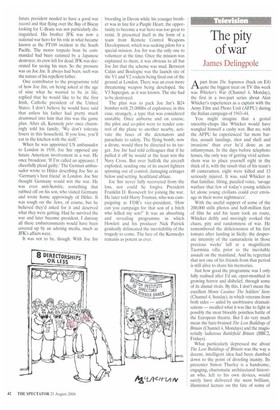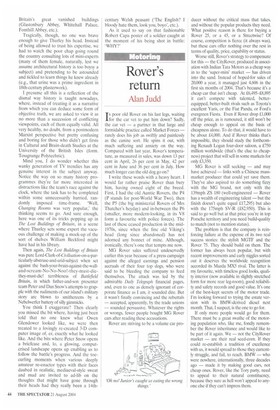The pity of war
James Delingpole
Apart from The Sopranos (back on E4) .quite the biggest treat on TV this week was Whicker's War (Channel 4. Monday), the first in a two-part series about Alan Whicker's experiences as a captain with the Army Film and Photo Unit (AFPU) during the Italian campaign of 1943-44.
You might imagine that a genial smoothy-chops like Whicker would have wangled himself a cushy war. But no, with the AFPU he experienced 'far more battles, assault landings, shot and shell and invasions' than ever he'd done as an infantryman. In the days before telephoto lenses, the only way of getting vivid actionshots was to place yourself right in the thick of it, with the result that of his team's 40 cameramen, eight were killed and 13 seriously injured. It was, said Whicker in that familiar, lilting, puzzled voice, 'savage warfare that few of today's young soldiers let alone young civilians could ever envisage in their worst nightmares'.
With the useful support of some of the 200,000 stills photos and half-million feet of film he and his team took en route, Whicker deftly and movingly evoked the chaos, pity and randomness of war. He remembered the deliciousness of his first tomato after landing in Sicily; the desperate intensity of the camaraderie in those precious weeks' lull at a magnificent Taormina villa prior to the inevitable assault on the mainland. And he regretted that not one of his friends from that period is still alive to share his memories.
Just how good the programme was I only fully realised after I'd sat, open-mouthed in growing horror and disbelief, through some of its dismal rivals. By this, I don't mean the excellent Monte Cassino: The Soldiers' Story (Channel 4, Sunday), in which veterans from both sides — aided by unobtrusive dramatisations — recalled what it was like to fight in possibly the most bloodily pointless battle of the European theatre. But I do very much mean the hare-brained The Lost Buildings of Britain (Channel 4, Mondays) and the magisterially ludicrous Battlefield Britain (BBC2, Fridays).
What particularly depressed me about The Lost Buildings of Britain was the way a decent, intelligent idea had been dumbed down to the point of drooling inanity. Its presenter Simon Thurley is a handsome, engaging, charismatic architectural historian who, left to his own devices, would surely have delivered the most brilliant, illustrated lecture on the fate of some of Britain's great vanished buildings (Glastonbury Abbey, Whitehall Palace, Fonthill Abbey, etc.).
Tragically, though, no one was brave enough to give Thurley his head. Instead of being allowed to trust his expertise, we had to watch the poor chap going round the country consulting lots of mini-experts (many of them female, naturally, lest we assume architectural history is too boysy a subject) and pretending to be astounded and tickled to learn things he knew already (e.g., that urine was a prime ingredient in 18th-century plasterwork).
I presume all this is a reflection of the dismal way history is taught nowadays, where, instead of treating it as a narrative from which you can deduce some form of objective truth, we are asked to view it as no more than a succession of conflicting viewpoints, each of them equally valid. All very healthy, no doubt, from a postmodern Marxist perspective but pretty confusing and boring for those who didn't get firsts in Cultural and Brain-death Studies at the University of the British Isles (form. Tossgrunge Polytechnic).
Mind you, I do wonder whether this wanky generation of TV trendies has any genuine interest in the subject anyway. Notice the way on so many history programmes they're far more interested in distractions like the team's race against the clock, where the task has to be completed within some unnecessarily hurried, randomly imposed time-frame. 'Well, Changing Rooms was very popular,' the thinking seems to go. And sure enough, here was one of its tricks popping up in The Lost Buildings of Britain, in a scene where Thurley sets some expert the vacuous challenge of making a mock-up of the sort of shelves William Beckford might have had in his library.
Then again, The Lost Buildings of Britain was pure Lord-Clark-of-Civifisation-on-a-particularly-abstruse-and-arid-subject when set against the bash-your-brain-against-the-walland-scream-No-No-Nool-they-must-diethey-must-die! terribleness of Battlefield Britain, in which father-and-son presenter team Peter and Dan Snow's attempts to grapple with the rudiments of our island's military story are blown to smithereens by a Nebelwerfer battery of silly gimmicks.
You think I exaggerate? Then clearly you missed the bit where, having just been told that no one knew what Owen Glendower looked like, we were then treated to a lovingly re-created 3-D computer image of, er, exactly what he looked like. And the bits where Peter Snow opens a briefcase and, lo, a glowing, computerised landscape opens up enabling us to follow the battle's progress. And the toecurling moments when various deeply amateur re-enactor types with their faces daubed in realistic, mediaeval-style sweat and mud are invited to ad-lib on the thoughts that might have gone through their heads had they really been a 14th
century Welsh peasant (The English? I bloody hate them, look you, boyo', etc.).
As it used to say on that fashionable Robert Capa poster of a soldier caught at the moment of his being shot in battle: 'WHY?'



























































 Previous page
Previous page